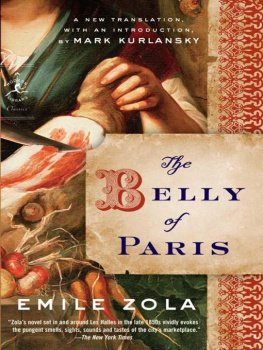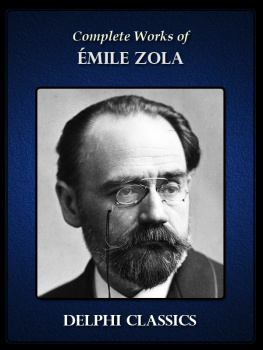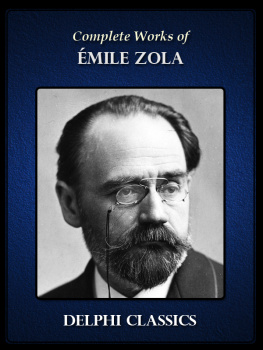Émile Zola (author) - The belly of Paris
Here you can read online Émile Zola (author) - The belly of Paris full text of the book (entire story) in english for free. Download pdf and epub, get meaning, cover and reviews about this ebook. year: 2009, publisher: Modern Library, genre: Detective and thriller. Description of the work, (preface) as well as reviews are available. Best literature library LitArk.com created for fans of good reading and offers a wide selection of genres:
Romance novel
Science fiction
Adventure
Detective
Science
History
Home and family
Prose
Art
Politics
Computer
Non-fiction
Religion
Business
Children
Humor
Choose a favorite category and find really read worthwhile books. Enjoy immersion in the world of imagination, feel the emotions of the characters or learn something new for yourself, make an fascinating discovery.
- Book:The belly of Paris
- Author:
- Publisher:Modern Library
- Genre:
- Year:2009
- Rating:5 / 5
- Favourites:Add to favourites
- Your mark:
- 100
- 1
- 2
- 3
- 4
- 5
The belly of Paris: summary, description and annotation
We offer to read an annotation, description, summary or preface (depends on what the author of the book "The belly of Paris" wrote himself). If you haven't found the necessary information about the book — write in the comments, we will try to find it.
The belly of Paris — read online for free the complete book (whole text) full work
Below is the text of the book, divided by pages. System saving the place of the last page read, allows you to conveniently read the book "The belly of Paris" online for free, without having to search again every time where you left off. Put a bookmark, and you can go to the page where you finished reading at any time.
Font size:
Interval:
Bookmark:
M ark K urlansky is the New York Timesbestselling author of Cod, Salt, and The Big Oyster, as well as a novel, Bugaloo on Second Avenue, and a short-story collection, The White Man in the Tree. He has won numerous awards, including the James A. Beard Award, and, as did Zola, frequently writes about food and politics. He lived in Paris for ten years.
Z OLA
Bernard, Marc. Zola par lui-mme. Paris: ditions du Seuil, 1962.
Brown, Frederick. Zola: A Life. New York: Farrar Straus Giroux, 1995.
Carter, Lawson A. Zola and the Theater. New Haven: Yale University Press, 1963.
mile-Zola, Franois, and Massin mile-Zola. Zola: Photographer. New York: Henry Holt and Company, 1988.
Josephson, Mathew Zola and His Time: The History of His Martial Career in Letters. Garden City, New York: Garden City Publishing, 1928.
Knapp, Bettina Liebowitz. Emile Zola. New York: Frederick Ungar Publishing, 1926.
Lanoux, Armand. Bonjour Monsieur Zola. Paris: Amiot-Dumount, 1954.
Zola, mile. Carnets d'enqutes: Une ethnographie indit de la France. Paris: Librairie Plon, 1986.
. Les uvres compltes: Correspondance (18581871). Paris: Franois Bernouard, 1928.
. Les uvres compltes: Correspondance (1872-1902). Paris: Franois Bernouard, 1929.
. Les Rougon-Macquart: Histoire naturelle et sociale d'une famille sous le Second Empire (3 vols.). Paris: Gallimard, 1961.
L ES H ALLES
Flanner, Janet. The Departed Glory of Les Halles. Life, May 12, 1967.
Hron de Ville Fosse, Ren. Les Halles: De Lutce Rungis. Paris: Librairie Acadmique Perrin, 1973.
Luce, Hoctin. Les Halles. The Paris Review, no. 40 (Winter-Spring 1967).
Moncan, Patrice de. Baltard, Les Halles de Paris. Paris: Les Editions de L'Observatoire, 1994.
Saint Girons, Simone. Les Halles: Guide historique et pratique. Paris: Librairie Hachette, 1971.
Seyler, Monique. Les Halles. Esprit, April 1968.
Stolley, Richard B. The Belly of Paris, Les Halles, Closes Forever. Life, March 14, 1969.
G UIANA
Londres, Albert. Au Bagne. Paris: Albin Michel, 1923.
Michelot, Jean-Claude. La Guillotine sche: Histoire du bagne de Cayenne. Paris: Librairie Arthme Fayard, 1981.
Miles, Alexander. Devil's Island: Colony of the Damned. Berkeley, Ca.: Ten Speed Press, 1988.
Pierre, Michel. La Terre de la grande punition: Histoire des bagnes de Guyane. Paris: ditions Ramsay, 1982.
F OOD
Davidson, Alan. The Oxford Companion to Food. Oxford, England: Oxford University Press, 1999.
Frentz, Jean-Claude. L'Encyclopdie de la charcuterie. Paris: Soussana, 1982.
Grigson, Jane. The Art of Charcuterie. New York: Alfred A. Knopf, 1968.
Kiple, Kenneth F, and Kriemhild Cone Ornelas, eds. The Cambridge World History of Food (2 vols.). Cambridge, England: Cambridge University Press, 2000.
Montagn, Prosper. Larousse gastronomique. Paris: Larousse, 1938.
Maya Angelou
A. S. Byatt
Caleb Carr
Christopher Cerf
Harold Evans
Charles Frazier
Vartan Gregorian
Jessica Hagedorn
Richard Howard
Charles Johnson
Jon Krakauer
Edmund Morris
Azar Nafisi
Joyce Carol Oates
Elaine Pagels
John Richardson
Salman Rushdie
Oliver Sacks
Carolyn See
Gore Vidal

In the silence of a deserted avenue, wagons stuffed with produce made their way toward Paris, their thudding wheels rhythmically echoing off the houses sleeping behind the rows of elm trees meandering on either side of the road. At the pont de Neuilly a cart full of cabbages and another full of peas met up with eight carts of turnips and carrots coming in from Nanterre. The horses, their heads bent low, led themselves with their lazy, steady pace, a bit slowed by the slight uphill climb. Up on the carts, lying on their stomachs in the vegetables, wrapped in their black-and-gray-striped wool coats, the drivers slept with the reins in their fists. Occasionally the light from a gas lamp would grope its way through the shadows and brighten the hobnail of a boot, the blue sleeve of a blouse, or the tip of a hat poking from the bright bloom of vegetablesred bouquets of carrots, white bouquets of turnips, or the bursting greenery of peas and cabbages.
All along the road and all the nearby routes, up ahead and farther back, the distant rumbling of carts told of other huge wagons, all pushing on through the darkness and slumber of two in the morning, the sound of passing food lulling the darkened town to stay asleep.
Madame Franois's horse, Balthazar, an overweight beast, led the column. He dawdled on, half asleep, flicking his ears until, at rue de Longchamp, his legs were suddenly frozen by fear. The other animals bumped their heads into the stalled carts in front of them, and the column halted with the clanking of metal and the cursing of drivers who had been yanked from their sleep. Seated up top, Madame Franois, with her back against a plank that held the vegetables in place, peered out but saw nothing by the faint light of the little square lantern to her left, which barely lit one of Balthazar's glistening flanks.
Come on, lady, let's keep moving, shouted one of the men who was kneeling in turnips. It's just some drunken idiot.
But as she leaned over she thought she made out a dark patch of something blocking the road, about to be stepped on by the horse.
You can't just run people over, she said, jumping down from her wagon.
It was a man sprawled across the road, his arms stretched out, facedown in the dust. He seemed extraordinarily long and as thin as a dry branch. It was a miracle that Balthazar had not stepped on him and snapped him in two. Madame Franois thought he was dead, but when she crouched over him and took his hand, she found it was still warm.
Hey, mister, she called softly.
But the drivers were growing impatient. The one kneeling in the vegetables shouted in a gruff voice, Give it up, lady. The son of a bitch is plastered. Shove him in the gutter.
In the meantime, the man had opened his eyes. He stared, motionless, at Madame Franois, with a look of bewilderment. She too thought that he must be drunk.
You can't stay there, you're going to get yourself run over, she told him. Where were you going?
I don't know, the man replied in a feeble voice. Then, with great effort and a worried face, I was going to Paris, and I fell. I don't know
Now she could see him better, and he was pathetic with his black pants and black overcoat, so threadbare that they showed the contour of his bare bones. Underneath a hat of coarse black cloth that he had pulled down as though afraid of being recognized, two large brown eyes of a rare gentleness could be seen on a hard and tormented face. Madame Franois thought that this man was much too feeble to have been drinking.
Where in Paris were you going? she asked.
He didn't answer right away. This cross-examination was worrying him. After a moment's reflection, he cautiously replied, Over there, by Les Halles.
With great difficulty he had almost stood up again and seemed anxious to be on his way. But Madame Franois noticed him trying to steady himself against one of the wagon shafts.
You're tired?
Very tired, he mumbled.
Font size:
Interval:
Bookmark:
Similar books «The belly of Paris»
Look at similar books to The belly of Paris. We have selected literature similar in name and meaning in the hope of providing readers with more options to find new, interesting, not yet read works.
Discussion, reviews of the book The belly of Paris and just readers' own opinions. Leave your comments, write what you think about the work, its meaning or the main characters. Specify what exactly you liked and what you didn't like, and why you think so.








